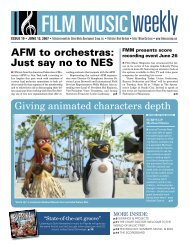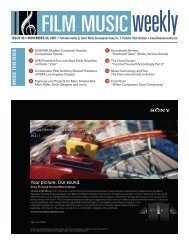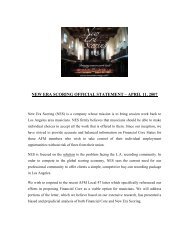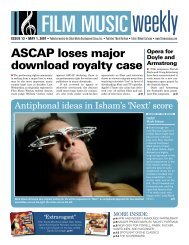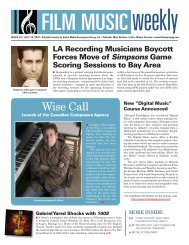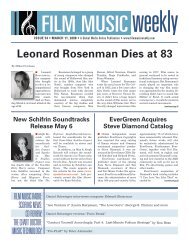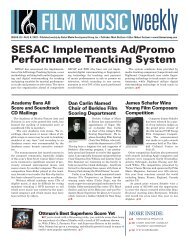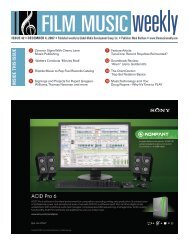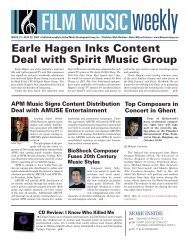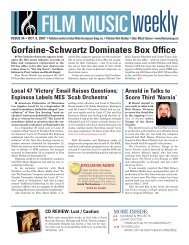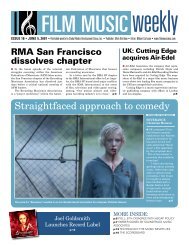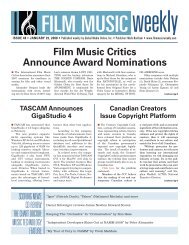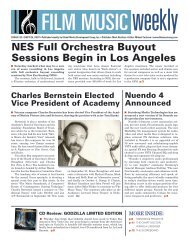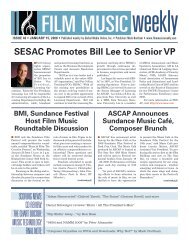February 12, 2007 - Film Music Magazine
February 12, 2007 - Film Music Magazine
February 12, 2007 - Film Music Magazine
Create successful ePaper yourself
Turn your PDF publications into a flip-book with our unique Google optimized e-Paper software.
NEW SOUNDTRACKS<br />
North’s galaxy<br />
of imagination<br />
<strong>Music</strong> for 2001: A Space<br />
Odyssey • The Original Score<br />
• Alex North • Intrada.<br />
ALBUM REVIEW<br />
BY DANIEL SCHWEIGER<br />
“Temp love” is the name of an<br />
often maddening condition that<br />
afflicts even the best directors,<br />
an unwillingness to consider<br />
anything outside of the pre-existing<br />
tunes that they’ve put into<br />
the movie’s rough cut. Woe be it<br />
for any composer who tries write<br />
something different, and hopefully<br />
better. Probably the most famous<br />
victim (or benefactor) of temp love<br />
fever was Stanley Kubrick, who<br />
wanted to use classical music for<br />
his space epic, but felt obligated to<br />
give composer Alex North the task<br />
of capturing the essence of Gyorgi<br />
Ligeti. Aram Khachaturian<br />
and Richard and Johann Strauss.<br />
Though North had given Kubrick<br />
one of the best scores in history for<br />
Spartacus, the task this time was<br />
as unwinnable as Kirk Douglas’<br />
battle against the Roman legion.<br />
And like that hero, North’s orchestral<br />
work for the first half of 2001<br />
was hung out to dry on the celluloid<br />
Apian way.<br />
While this classic lost work was<br />
re-performed by Jerry Goldsmith<br />
for Varese Sarabande Records in<br />
1993, the actual tapes for North’s<br />
2001 sessions were thought to be<br />
lost somewhere outside of Jupiter’s<br />
vicinity. That is until the intrepid<br />
explorers at Intrada tracked down<br />
the only tapes in existence of<br />
the original score. And while I<br />
wouldn’t put away the Goldsmith<br />
cd (which is easily the best-sounding<br />
North version of 2001 we’ll<br />
have), this soundtrack is the real<br />
treasure, a striking discovery of<br />
primordial savagery, expressionistic<br />
melody, and even playfulness<br />
that captures the mystery of<br />
man’s destiny in outer space. But<br />
whether Alex North’s music actually<br />
worked in the film as well as<br />
“The Blue Danube” or “Also sprach<br />
Zarathustra” is up to you. And Intrada<br />
has made that musical taste<br />
test easier by providing dvd synch<br />
points to see how North’s score<br />
would have functioned over the<br />
movie’s first fifty minutes. And as<br />
much as I love Alex North and film<br />
music in general, I’d definitely<br />
vote for Kubrick’s choice (though<br />
certainly not for the way he didn’t<br />
bother to tell North that he’d<br />
dumped his score).<br />
Stanley Kubrick’s act of musical<br />
anachronism will inspire a<br />
score vs. classical music debate<br />
that will probably go until the<br />
end of time. But it’s also a major<br />
reason why 2001 has stood that<br />
test. For as striking as North’s<br />
score is, it also makes 2001 into<br />
an obvious “movie” if you will-<br />
and a musically busy one at that.<br />
Where Kubrick’s classical choices<br />
had a simple elegance to them,<br />
North’s music often says way too<br />
much, its experimental melodies<br />
far bigger than Kubrick’s sparsely<br />
composed imagery. While North’s<br />
music in cues like “The Foraging”<br />
and “Night Terrors” gets across<br />
the unbearable tension of living in<br />
a cat-eat-ape world, his creeping<br />
strings suffocate the primeval moment.<br />
Kubrick’s use of silence over<br />
these scenes gets across a sense<br />
of stark realism – whereas Alex<br />
North’s music would have turned<br />
the apes into guys in suits. Indeed,<br />
the comparisons between North’s<br />
work in the dawn of man sequences<br />
and Jerry Goldsmith’s landmark<br />
score for Planet of the Apes<br />
(released the same year) immediately<br />
come to the scoreophile’s ea-<br />
two masters both hearing simians<br />
in expressionistic ways, but one<br />
far luckier to be doing it in an obvious<br />
“sci-fi” movie. The same can<br />
be said for North’s emphatic musical<br />
approach during the shuttle<br />
docking and moon<br />
landing sequences.<br />
While once again<br />
beautiful on their<br />
own right, North’s<br />
undulating, complex<br />
music gives<br />
the gentle gliding<br />
of Kubrick’s models a weird unsteadiness.<br />
It’s “busy” music that<br />
lacks the elegance of “The Blue<br />
Danube,” which truly gets across<br />
the sense of gliding through space.<br />
And in Dr. Floyd’s “Space Talk” inside<br />
of the station, North’s gossamer<br />
strings and bells have a cloying<br />
sweetness that runs over the<br />
dialogue. Then in “Moon Rocket<br />
Bus,” the driving orchestra makes<br />
it seem like Dr. Floyd is off to battle<br />
the Empire as opposed to finding<br />
the monolith, North’s use of<br />
chorus and strings coming across<br />
as being “sci fi.”<br />
Kubrick’s use of Ligeti’s “Lux<br />
Aeterna” had a subtle, and tremendously<br />
effective eeriness to<br />
it- the sense of man about to approach<br />
the unknowably alien. Yet<br />
if there’s one area where North<br />
actually beats Kubrick’s temp,<br />
then it’s in “Bones.” Obviously<br />
patterned on “Zarathustra” (right<br />
down to climactic organ), North<br />
brings across even more fierceness<br />
to man’s discovery of the instruments<br />
of death, a fierce, savage<br />
pride that builds to a mythic crescendo-<br />
all of it working brilliantly<br />
to picture. But on its own terms,<br />
North’s 2001 remains a testament<br />
to the composer’s ability to push<br />
the boundaries of film music. After<br />
all, this was the man who helped<br />
bring jazz into movie soundtracks<br />
with A Streetcar Named Desire,<br />
and whose unconventional melodic<br />
structure made epics like<br />
Cleopatra truly touch the gods- an<br />
impressionistic style that reached<br />
its zenith with North’s Oscar<br />
nomination for Dragonslayer. But<br />
unlike those films, 2001 is a work<br />
even better suited for the concert<br />
hall than the film screen, music<br />
whose impact remains at once experimental<br />
and melodic – as much<br />
“program music” as the waltzes<br />
and suites that North was asked<br />
to emulate by Kubrick. That he<br />
came up with a score that captured<br />
their classical spirit, without<br />
imitating it, speaks to the abilities<br />
of a true, modern maestro whose<br />
work Mozart would probably have<br />
been impressed by.<br />
Intrada has done a yeoman job<br />
with the last word on the 2001<br />
scoring saga, getting the best<br />
sound possible from the recordings,<br />
and comprehensively detailing<br />
the temp love struggle in the<br />
cd’s liner notes- wrapped up with<br />
a touching epilogue to North’s wife<br />
Annemarie by album producer<br />
Nick Redman. Whether you love<br />
or hate him for it, Stanley Kubrick<br />
certainly made a bold choice to<br />
musically explore space with, a<br />
classical approach he’d successfully<br />
continue for the rest of his career.<br />
And even if it didn’t work for<br />
the film itself, Alex North’s music<br />
went boldly, and originally where<br />
no composer had gone before. And<br />
here, it’s a listen that will conjure<br />
its own galaxy of imagination. n<br />
Courtesy of iFmagazine.com<br />
COMING SOON!<br />
n MILAN RECORDS. Already<br />
available in Europe, After the<br />
Wedding, Johan Söderqvist’s<br />
score for the Oscar nominated<br />
Danish drama, will be released<br />
by Milan Records in the US on<br />
March 27.<br />
FILM MUSIC weekly ISSUE 2 • FEBRUARY <strong>12</strong>, <strong>2007</strong> 9



